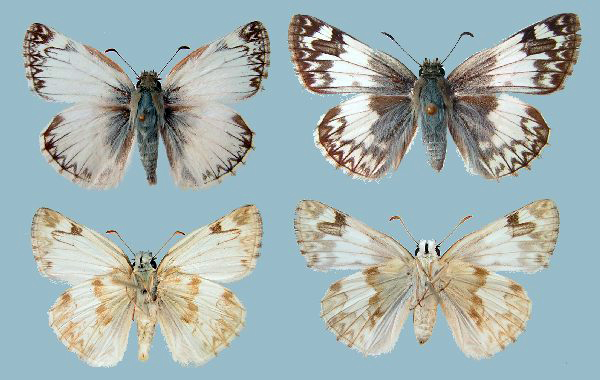Heliopetes ericetorum

Photo Life History: Heliopetes ericetorum
Habitat: Desert Hills & Mountains; Mountain Canyons
Host Plants: Sphaeralcea ambigua; Sphaeralcea coccinea
Suitable Lab Host Plants: Sida hederacea; Malva neglecta; Alcea rosea or any other available mallows. Caterpillars are generalists and have accepted any species I have offered them in the lab.
Caring for Live Female Butterflies: Nectaring techniques
Methods of Female Oviposition: Portable Cages; Open Screen Cages
How to Find Eggs:
How to Hatch Eggs: Consolidate eggs into one container
How to Find Caterpillars in the Field: Look for unique skipper nests (Scroll down to find skipper nests for the great white skipper.) Skipper nests on globe mallows can be quite conspicuous.
Caterpillar setups: Open terrariums;
Larva to Pupa: Larva pupates in caterpillar nest by creating a cremaster and girdle.
How to Find Pupae in the Field: Look for Skipper Tents and Trap Doors; Look for Skipper Nests;
Number of Broods per Year: 2-3; depending upon area
Overwintering Stage: First through fifth instars
Overwintering Strategies: Your Own Backyard;
Post-Hibernation Strategies: Larvae should be exposed to warmer days and healthy host plant.
Avoiding Diapause Techniques: In order to avoid diapausing larvae in the fall (or any other time of the year), simply provide them with healthy host plant, and they will proceed through to pupa and emerge immediately.
Disease Prevention: In a closed container, change out host plant and remove frass every two to three days. With the open bucket technique, replace hostplant when it dries out and remove frass every time you remove host plant (likely every 3-5 days depending upon the quality of leaves you feed the larvae). Mallow-feeding caterpillars of the Pyrginae are somewhat disease resistant if you take pretty good care of them.
Emergence: Emergence Container
Field Notes: I've had pretty good luck finding immatures in the Mojave Desert of Washington County in near the Red Hill Country north of St. George. Larvae can be found during the month of March on globe mallow at almost any instar.

